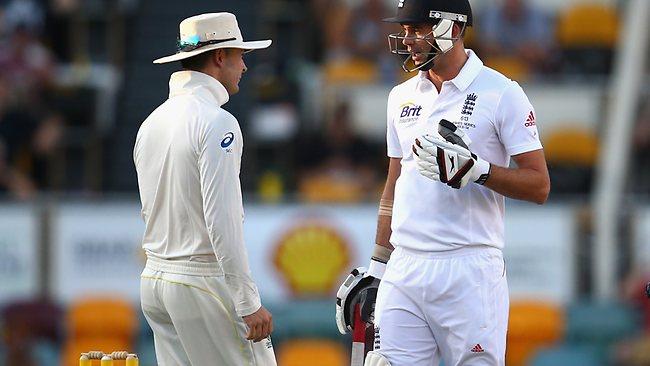Packed Ashes cricket schedule frays tempers, causes Gabba eruption
SO little time between Ashes series means that ill feeling between the teams is getting worse.

YOU have to go back nearly four decades, to the days of Dennis Lillee and Jeff Thomson, for the previous time England and Australia engaged in back-to-back Test series.
Events in Brisbane over the past week show why schedulers must not inflict this again.
Players must feel as though they are facing each other in their sleep and ill feeling between the teams is getting worse.
With little evidence of cordial relations, Alastair Cook, the England captain, admitted that the proximity of 10 Tests crammed into less than seven full months is contributing to heightened tension off and particularly on the field.
"When you play each other for quite a few games in a row, niggles do increase," he said.
The treatment of Stuart Broad in Brisbane reflects insufficient time to heal summer wounds. No praise is high enough for the way he kept his game together in the face of unprecedented vilification in the local media on top of verbal abuse from the stands.
Broad would surely not have been targeted to the same degree had a year or longer passed from his (entirely valid) decision not to "walk" at Trent Bridge.
Instead, the gap was a mere 88 days between the end of the previous series and the start of this one.
Even that figure is misleading because of the one-day international series in between. England might have treated it as the end of one Ashes series, resting five key players, but to Australia it was the start of preparation for the next. It was here that Mitchell Johnson exposed the weakness in Jonathan Trott's back-foot play that has been magnified over the past week.
Johnson did not feature in the five Tests in England, but most of the combatants did. Players know each other's games inside out. Thus was Cook removed in the first innings at the Gabba in a manner very familiar to those who watched over the summer, pushing outside off stump without taking his weight forward. Shane Watson only narrowly escaped yet another leg-before decision.
With so many backroom staff and computers stored with footage, players are always forewarned about strengths and weaknesses.
Even so, nothing matches personal experience. Broad was confident in bouncing out Michael Clarke in the first innings because of his success in the English summer, not because he had seen the batsman flinching in a clip on YouTube forwarded to him by the bowling coach.
Opponents are also familiar because fresh faces have not had time to come through. It will be a different England team in a year's time with Ben Stokes, Gary Ballance and Boyd Rankin pushing for places.
One or two familiar figures may have retired. This does not feel like a sequel as much as part two of a serial.
Even the traditional post-series drinks between the camps in England three months ago were affected by the impending start of the return leg.
Historically, these sessions can go long into the night. At The Oval in August, according to Clarke, the Australian players spent only an hour or so in the England dressing room before heading back to enjoy their own company.
As James Anderson, who accused Clarke of being "paranoid" in the build-up, said: "I found it quite awkward when you have been at each other's throats for six weeks to then sit down for a beer and a chat."
We are here because the ECB and Cricket Australia wanted to break the cycle where an Ashes series Down Under is followed almost straightaway by a World Cup.
England were not due to tour until 2014-15, but that has been brought forward by 12 months to avoid clashing with the premier one-day event in February and March 2015.
This makes sense, although cynics will note that the two boards have added a series in England in 2015 into the schedule.
At least in future, tours will follow the same pattern as before in 2016-17, 2019, 2020-21, and so on.
That will give us all time to calm down.
The Times


